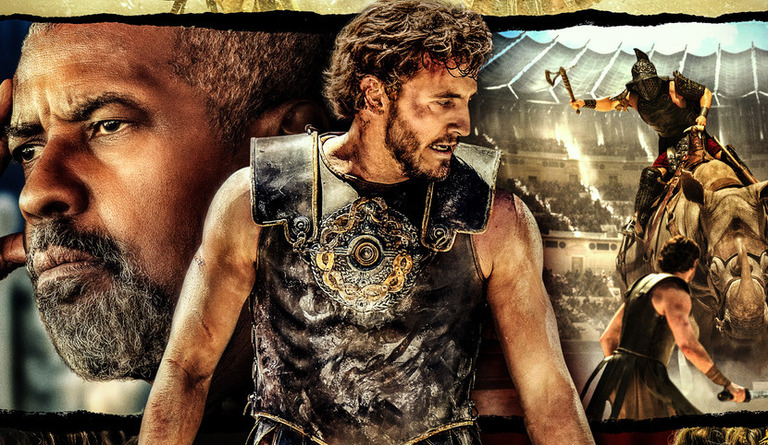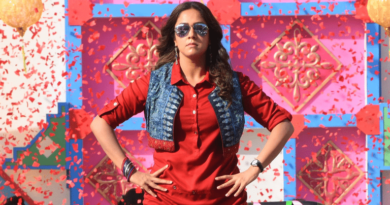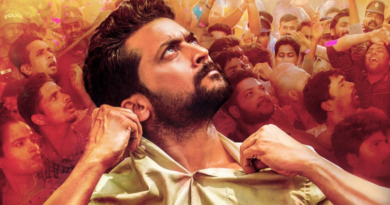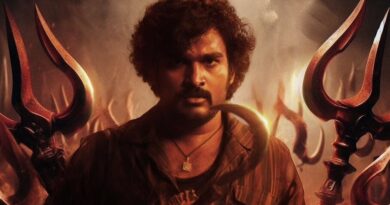Gladiator II Review: A Remarkable Epic!
Epic films have been one of the cornerstones of cinema since its conception, ranging from historical epics to fantasies beyond our wildest dreams. Epics consist of some of the most memorable films to date that have carved spaces in our popular culture and hearts, including The Lord of the Rings, Ben-Hur, Titanic, 2001: A Space Odyssey, and the 2000 classic Gladiator.
Related: ‘Wicked’ Movie Review – Defies Expectations!
As it seems today, people confuse big-budget or tentpole movies with epic films, certainly not going hand in hand. We have seen a decline of epic genre films in the last decade as studios save their money for multi-chapter based films that promise growing franchises to then sell merchandise and the souls of those who sign onto these never ending projects.
Gladiator was made in a time where audiences flocked to cinemas to experience moments in history that can only be fathomed through grand storytelling on a cinematic level. Although Gladiator II is a sequel to its classic predecessor with said established fanbase, its storytelling is reminiscent of a time passed where action sequences were a grand spectacle but it was the thematic stakes and gripping drama that made it connect with audiences. In this way, Ridley Scott harks back to grand filmmaking where the determination, courage, and drive of our lead characters inspire generations to believe in not just the possibility for change but the beauty of cinema to transport us, entertain us, and connect us together.
We’ll see you in the arena. Get tickets to see #GladiatorII NOW PLAYING in theatres https://t.co/10uxGQ2pzb pic.twitter.com/Gil4xoB5OH
— Gladiator Movie (@GladiatorMovie) November 22, 2024
At the end of Gladiator, Maximus Decimus Meridius has died after fighting and defeating Commodus the Emperor. His son Lucius has just witnessed the death of who he called the “Savior of Rome” unknown to the fact that Maximus is his real father.
Sixteen years later, Lucius (Paul Mescal) is still alive, despite his mother Lucilla’s (Connie Nielsen) assumption he died when she sent him away from Rome to protect him after Commodus’s death. Living in Numidia with his wife Arishat, Numidia is invaded by Roman armies led by Marcus Acacius (Pedro Pascal) where his wife is killed and he is enslaved by the Romans, leading him to becoming a successful gladiator.
However, Lucius still dreams of the vision of Rome set forth by Marcus Aurelius and vies to do whatever it takes to fight, survive, overcome, and change Rome’s corruption in light of a better world for its people. As Rome would have it, even a slave can become a king, words reiterated by Macrinus (Denzel Washington), and Lucius may just be the catalyst to a historical uprising.
The legacy lives on. #GladiatorII pic.twitter.com/zuQ85BIPcu
— IMAX (@IMAX) November 20, 2024
Paul Mescal as Lucius proves himself as an influential character leading Gladiator II. Mescal’s portrayal and the development of Lucius by screenwriter David Scarpa allows for him to connect with the audience in his own way. His character surpasses any type of obligatory bond because of his relation to Maximus and instead gives us someone worthy to root for based on his bravery and strength in and outside of the ring.
Oftentimes films depend on a sequel’s character to connect with audiences because of their association with previously beloved heroes. Gladiator II has an emotional pull because of Maximus and Lucius’s father-son bond, but it does not define him as a character. He is a character who possesses a fiery fight within him while also looking and hoping for a better world for Rome’s people. He is both a dreamer and a warrior that exudes charm for his multidimensional arc.
Gladiator II’s use of special effects, practical effects and astonishing set pieces is divvied up well to create a realistic yet breathtaking viewing experience. Knowing when to utilize various cinematic elements to make the most of your film is a quality Ridley Scott often implements, having been working through decades of constant technological and industry changes. Where the film could have undergone a massive CGI makeover, Scott knows that the smaller details make all the difference.
Lights, camera, selfie 📸 Get tickets for #GladiatorII – in theatres now. https://t.co/10uxGQ1RJD
📸: Nisha Johny, Jonathan Jacobs pic.twitter.com/wvBzoXN0pW
— Gladiator Movie (@GladiatorMovie) November 23, 2024
Having set pieces like the Colosseum built in Morocco allowed for the special effects in the fight sequences to work exceptionally. Although SFX will always overpower CGI, using CGI to create the animals in the ring was a worthwhile choice to allow the film to play out in its gory glory while maintaining a safe set for actors and animals alike. The historical nature of the epic was well in tune with Scott’s vision to create a Rome mirroring that of Gladiator while also possessing a newer and more dangerous quality.
In a film that promises gladiator sword fights and warrior violence, Scott amps up the epic drama rather than all out action to mirror what made the first film brilliant. Gladiator II succeeds the most in the more subtle and calming scenes where Lucius is building up his relationships with soldiers and city-folk like Ravi (Alexander Karim), a gladiator turned doctor, discovering the climate of Rome’s people in the face of two corrupt Emperors Geta (Joseph Quinn) and Caracalla (Fred Hechinger).
Even in Macrinus’s (Denzel) quarrel with the Emperors with his own plan in mind to gain power, Gladiator II knows a strong foundation of authoritarian mistrust and hope creates a film for its characters to stand, and fight on. As a result, the film brings back into focus what made Gladiator so remarkable and makes Gladiator II its own film to finish laying the groundwork.
‘Gladiator II’ Rating – 4/5
Follow Steph (the Author) on IG – @cinemasteph_7
- Sinners Review: A Cinematic Spectacle! - April 23, 2025
- The Ugly Stepsister Review: A Fairy Tale in the Twilight Zone! - April 16, 2025
- SXSW 2025 Review: “Hallow Road” – A Twisted Road Trip! - April 3, 2025





Pingback:SCRAP Review: Poignant and Powerfully Authentic! - Just for Movie Freaks